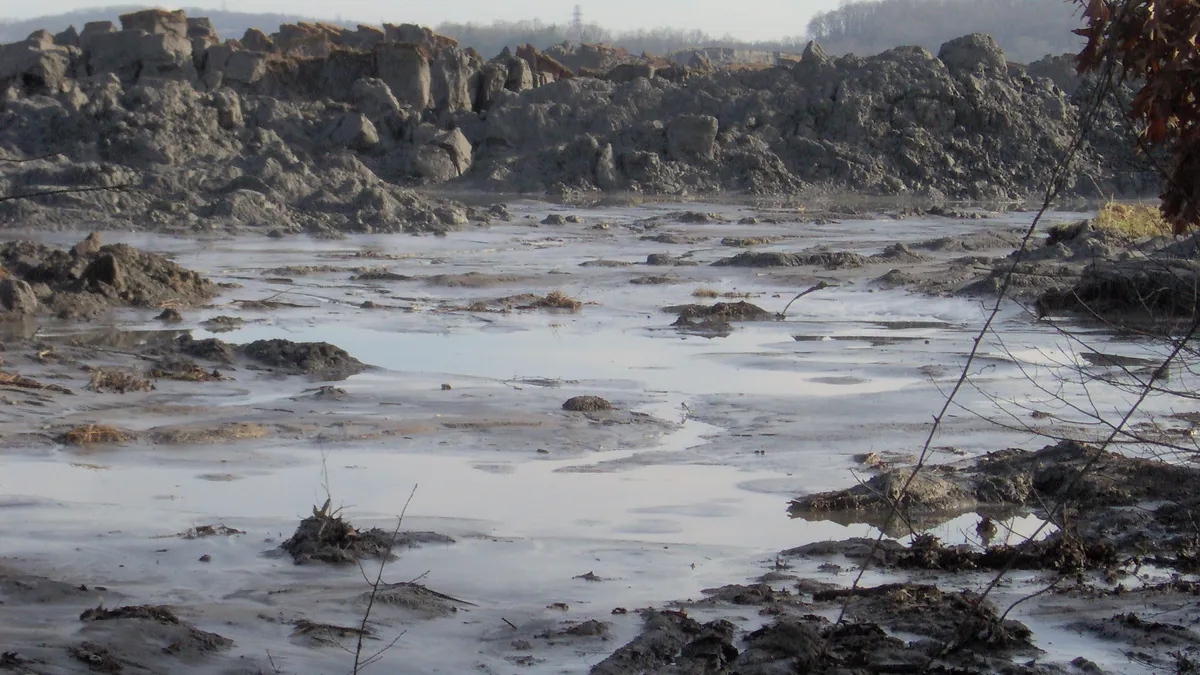Dive Brief:
- Major utilities across the United States have reported groundwater contamination at the sites of unlined coal ash ponds, data now available thanks to monitoring requirements in the Obama administration's Coal Combustion Residuals rule.
- Friday filings at the Environmental Protection Agency show groundwater contamination at dozens of plants owned by utilities such as AEP, Duke Energy, Xcel Energy, the Tennessee Valley Authority and others — many exhibiting radioactivity levels multiple times higher than federal drinking water standards.
- The EPA last week moved to roll back the Obama-era coal ash rule, making the regulatory consequences of the groundwater filings unclear. Officials at Duke Energy say the results are misleading and are not reflective of groundwater conditions in areas near populations.
Dive Insight:
Unlined coal ash pits are more susceptible to leaks than those lined by clay or plastic, and new utility filings show that contaminants are escaping from containment facilities across the country.
According to Earthjustice, which analyzed Duke Energy’s results, there were "startlingly high levels of radioactivity at 11 out of 18 plants." And the environmental advocacy group also says Duke appears to have taken steps to obscure the findings by not summarizing its groundwater monitoring results in a table, as is customary.
Earthjustice Senior Attorney Lisa Evans said the utility included them in more than 20,000 pages of lab results.
“The way Duke Energy presented its data showed a clear intent to obscure the findings,” Evans said in a statement. “Despite Duke’s efforts, we found that the data reveal levels of radium in groundwater that far exceed EPA’s drinking water standards and that could clearly harm people who use this water for drinking.”
Officials at Duke, however, say activist groups are distorting the findings. The utility has data from groundwater testing required by North Carolina, in addition to the new federally-required data, and says it will utilize what amounts to "an enormous amount of information on groundwater at these facilities" to safely close the coal ash basins, as required by the state.
"This is another attempt by critic groups to mislead the public and advance their agenda to close ash basins in the most extreme, most disruptive and most expensive way," Duke spokesperson Erin Culbert said in a statement.
Culbert also said the groundwater monitoring wells in the report are located immediately next to the ash basin or landfill "and do not reflect groundwater conditions farther away or off plant property where neighbors are located."
But activists say the amount of radiation is a risk to public health. Earthjustice also noted that the EPA standard for radioactivity in drinking water was written more than four decades ago and needs updating.
At Duke's Marshall coal plant, Earthjustice's parsing of Duke's filing shows levels of radioactivity from radium at 2.5 times the federal drinking water standard. Thallium levels at Marshall also exceeded federal standards and were 18 times higher than the state regulations allow.
Duke, however, says this is another instance where activists are being disingenuous. At the Marshall plant, said Culbert, "groundwater near the ash basin is actually moving away from neighbors’ wells."
But the findings come to light just as the Trump administration is moving to loosen the CCR regulations, making the impact unclear.
Last week the EPA proposed a dozen changes to coal regulations, including allowing states to design their own standards for ash disposal. The agency says the changes would save the power industry $100 million a year through reduced compliance costs. The agency also took steps to loosen some regulations in the oil and gas industry, expected to result in $14 million in savings.
Finalized in 2015, the CCR rule is currently being challenged in the U.S. Court of Appeals for the D.C. Circuit.














